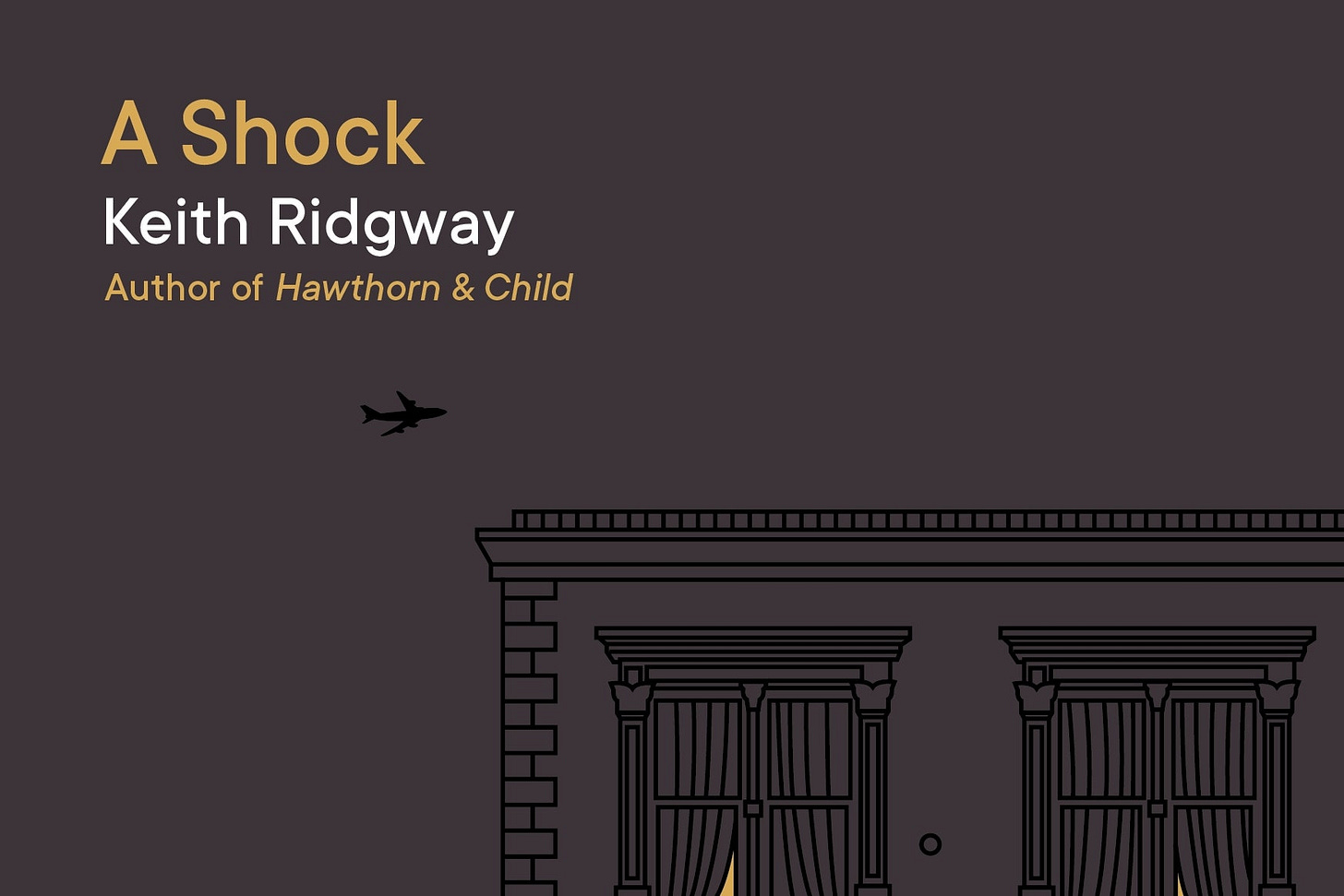London book gift guide part 2: Fiction
With personal recommendations from the authors themselves
Welcome to your mid-week issue of London in Bits. LiB is an independent publication that is only made possible through paid subscriptions. If you’re not a subscriber already and you want to read this and past issues (like our recent conversation with a London cabbie, or our look at whether London should become a ‘15 minute city’) then please click the button below:
For the second half of our literary gift guide we’ve got five of our favourite works of London-centric fiction for you (here’s last week’s non-fiction picks in case you missed them). Again we’ve managed to get a couple of the authors to provide us with some personal recommendations on the kind of person they think would love to receive their book this Christmas. And, just like last week, there’s no Amazon links in here, instead we’ve linked to the publisher’s site and/or Bookshop.org.
Where we can we’ve also provided a link to buy from Bookseller Crow. They’re our favourite independent London bookshop, so if you don’t already have a local shop you like to support then you could do worse than buy from them.
London Gothic by Nicholas Royle
Nicholas Royle is a literary Swiss army knife. He’s written seven novels, two novellas and edited twenty anthologies of short stories. On top of that he also runs Nightjar Press, which publishes signed, limited-edition chapbooks. He also obsessively collects Picador editions.
On top of all that Royle has written more than 100 short stories, fifteen of which are in the London Gothic collection. Imagine Paul Auster but in London (and a bit less up himself) and you’ll get close to what London Gothic has to offer. It’s all unsettling vignettes, humdrum settings injected with half-felt menace, a good pinch of acerbic wit and more than a whiff of psychogeography.
When we asked Nicholas to tell us the kind of person who might be glad to unwrap London Gothic on Christmas morning, here’s what he said:
“This book would be a perfect gift for the person who loves dark neighbourhoods, secretly listens to minimal techno and demands everyone watches Eyes Wide Shut every Christmas.”
Buy it direct from the publisher
Little Scratch by Rebecca Watson
Little Scratch was recommended to us back in August by the author Will Wiles as part of our conversation about the ‘death’ of psychogeography. Here’s what Will had to say about the book then:
“It’s a stream of consciousness: what the protagonist is thinking as she goes about her day going from her flat to an office and back. As such, it’s a quite vivid description of commuting and going out in the evening and going out for lunch in the office and so on. It's visceral. It really feels realistic and accurate and I think it’s quite an extraordinarily alive depiction of life in London, which deserves to be much more highly praised. I was very disappointed it wasn't on the Booker long list. It’s kind of Nicholson Baker’s The Mezzanine but for modern London.”
That’s a pretty enthusiastic recommendation from someone who reads a lot of books set in London; and now we’ve read it too we have to agree with Will. Little Scratch is an incredibly poetic and powerful book that (like London Gothic, but also not like London Gothic) somehow turns the mundane into the miraculous (The Guardian called it “an extremely perceptive depiction of power and agency” while also noting that one page is mostly taken up by the word ‘filling’ “because her character is, indeed, filling a water bottle”).
It’s not a book you would imagine would transfer easily to the stage, but that’s exactly what happened earlier this month when Little Scratch the play opened at the Hampstead Theatre, and it’s been as well-received as the book, picking up four and five star reviews all over the place.
Buy a signed copy from Bookseller Crow
A Shock by Keith Ridgway
If London Gothic and Little Scratch got together and had a literary baby then it might look a lot like Keith Ridgway’s latest novel.
A Shock features a good deal of stream-of-consciousness narrative and, like London Gothic, it’s also a book that’s obsessed with secret rooms, vanishing people and the gaps between walls.
A Shock is comprised of nine connected-but-not-connected stories, with a central narrative of a man and a woman drinking in a pub making up stories for each other while also trying to convince the landlord to turn the place into a Muriel Spark theme pub (if the idea of naming the pub toilets “The Bachelors” and “The Girls of Slender Means” makes you smile then this is your kind of novel).
It’s no coincidence that Murial Spark spent a decade living in a bedsit in Camberwell, and Ridgway has called this book “a Camberwell and Peckham novel.” If you know the area then there are a lot of specific streets, houses, shops and pubs to spot here.
You can read the first chapter of A Shock on the New Yorker’s website.
Loom by Matthew Turner
Matthew Turner is (among other things) Visiting Professor of Architecture and Visual Theory at the University of Bergen, and this novella originally began life as an article for a London-themed issue of Icon Magazine in which he examined “those strange areas on the outskirts of cities where the urban met rural”.
But don’t assume this is yet another psychogeographic tour of London’s hinterlands (Matthew has said himself that he didn’t want to write another “man walking around London” book). Loom is definitely much more than that. It takes in themes like wealth, decay, identity, property and art, as well as capturing London as a character in a way no other book we’ve read in the past few years has managed to do. We would describe it as House of Leaves as rewritten by JG Ballard, but we’re not the author so we got in touch with Matt to give us a description of the kind of person who might be glad to find Loom under their tree this Christmas. Here’s what he said:
“Loom is for the kind of person who looks at a derelict mansion and instead of walking by its boarded up windows and overgrown grass, pauses for a minute to imagine what happened there. All homes have secrets, and they are either stories or ghosts.”
Buy Loom direct from the publisher
Or, alternatively, you could a copy of Best British Stories of 2021 (edited by some guy called Nicholas Royle) as it contains Loom as well as a lot of other great short fiction.
Keeping the House by Tice Cin
When it came out in September, The Guardian called this novel by “interdisciplinary artist” Tice Cin “an exhilaratingly idiosyncratic debut” that had “cult classic written all over it” and it’s only picked up increasingly glowing accolades since then (Bookshop.org just included Keeping The House in its 2021 Books of the Year list).
Set in the Turkish communities of north London between 1999 and 2012, the story centres around three generations of women: a single mother, her ageing mum and her teenage daughter. It’s also a book about the heroin trade, which features fascinating details like how the drug is smuggled to the UK in crates of Turkish cabbages (because the Turkish variety has larger leaves, obviously). The fact that it manages to bring that world to life in a very real, non-Guy Ritchie way, while also being a very poetic and lyrical book, is what makes Keeping The House so fun and so exciting to read.
If you need more convincing, you can read the first chapter of the book here.
Honourable mentions
We haven’t had chance to read Sterling Karat Gold by Isabel Waidner yet, but it just won the Goldsmiths prize (for “fiction at its most novel”) and it’s about non-binary migrant cleaner who is arrested in London while co-producing a crowdfunded performance art project. How can you not want to read that?
Buy it from Bookshop.org or Bookseller Crow
Similarly, Victoria Park by Gemma Reeves is still on our ‘to read’ pile, but the book (which follows the lives of twelve people over the course of a single year. set to the backdrop of an acid attack in the park) has been getting comparisons to Jennifer Egan and Elizabeth ‘Olive Kitteridge’ Strout, and that’s good enough for us.
We should also put in a mention here for Will Wiles’ novel, Plume. It’s the Ballardian, ballsy, satirical and sinister London novel that everyone should own. Available from Bookseller Crow. Read our two-part interview with Will here and here.
And the rest…
The Telegraph has an interview with new London Fire Brigade chief, Andy Row, in which he says “it would be entirely complacent of someone in my position to say that [Grenfell] couldn’t happen again.”
Apparently central London was “only ever so slightly busier” on Black Friday with a 2.3% more people week on week. That’s still a 22.3% decrease on 2019 levels.
Sadiq has released a video explaining why moving City Hall will save London “millions”:
Back to the Telegraph, who has taken a look at the “ballooning costs, delayed buildings and limited footfall,” getting in the way of Stratford’s post-Olympic regeneration.
Wan to see a video of the penguins at London Zoo posting letters to Santa? Of course you do.
The Mobile Phone Museum is an online archive that went live this week, “showcasing a comprehensive history of thousands of notable and iconic devices, spanning back to 1984.” To mark the launch they’ve created an exhibition in Soho, and of course Dom Joly turned up:











